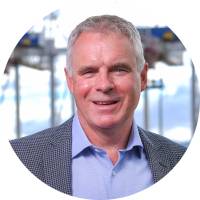The new vending machine: a treasure trove of AI solutions

Artificial intelligence is like having a hyper intelligent intern who has graduated from all the best academic institutions simultaneously, says Chris Day CMInstD, but with minimal life or work experience or need for constant support and leadership.
Also likening the fast-moving technology to a car, Day describes AI as the engine and data as the fuel. However, he emphasises that many organisations are overlooking or undervaluing the quality of data – a critical component for AI success – with recent Datacom research showing just nine per cent of New Zealand organisations would consider their data to be 100 per cent ‘clean’.
While companies may have initially viewed AI as merely a ‘tech thing’, Day, who is on the board of Datacom and the Institute of Directors, argues it represents an all-of-business opportunity.
Drawing from Datacom’s extensive experience, Day emphasises the critical role of an AI Centre of Excellence (CoE) in operationalising AI initiatives. “Leading businesses may have developed a charter to provide safety and opportunity, but it is the CoE which turns this vision into reality,” he says.
Operating as a centralised hub, the CoE not only defines the why of AI initiatives – bringing customer value, increasing productivity and reducing costs – but more importantly it implements the ‘how’. It acts as the operational engine that powers AI transformation, translating strategic intent into tangible outcomes and sustainable capabilities.

Chris Day
One of the CoE’s focus areas is establishing what Day calls an ‘AI vending machine’ – an enterprise platform that serves as both a showcase and secure repository for AI solutions across the organisation.
It goes beyond simple AI tool access, functioning as a place where teams can discover existing AI capabilities, access reusable code and components to accelerate development, and deploy new solutions within established governance frameworks.
“We need loose governance to facilitate possibility,” Day says, “but also hard governance to ensure security, IP protection, ethical use, cyber safety, and rigorous evaluation of use cases. All the guardrails need to be in place – and for many organisations, they currently aren’t.”
The most common challenge Day encounters is, “How do I get to commercial value?” His advice is straightforward: forget the tech initially and start with use cases, focusing on opportunities to improve productivity and efficiency. “Metrics and baselines are important – like they are in many other contexts – so focus on understanding these, the tangible outcomes and return on investment,” he emphasises.
At Datacom, he says this practical approach has led to 40-50 active use cases progressing and becoming a part of their natural ways of working. Through the CoE’s operational framework, these initiatives are systematically evaluated, implemented and monitored. Day acknowledges that not all these initiatives will necessarily succeed commercially, but they represent essential learning opportunities.
He observes that many organisations are still cautious about AI adoption – “customers are a metre from the pool and wanting to dip their toe in but are not sure.” However, he remains inherently optimistic about the technology’s potential.
“AI initially presented as a cool new thing, and likely a risk to manage, so in many contexts it was how do we keep ourselves safe from it? Now it is much more about how we safely embrace it and make the most of this wonderful new capability.”
As the Harvard Business Review so powerfully notes, “AI won’t replace humans . . . but humans with AI will replace humans without AI”.